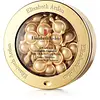What's inside
What's inside
 Key Ingredients
Key Ingredients

 Benefits
Benefits

 Concerns
Concerns

 Ingredients Side-by-side
Ingredients Side-by-side

Isononyl Isononanoate
EmollientIsodecyl Neopentanoate
EmollientIsododecane
EmollientIsopropyl Myristate
EmollientDimethicone
EmollientCamellia Japonica Seed Oil
EmollientDivinyldimethicone/Dimethicone Copolymer
Dimethicone Crosspolymer
Emulsion StabilisingCaprylic Acid
CleansingCaprylic/Capric Triglyceride
MaskingCeramide EOP
Skin ConditioningCeramide NP
Skin ConditioningCeramide AP
Skin ConditioningCholesterol
EmollientCocos Nucifera Oil
MaskingCrithmum Maritimum Extract
Skin ConditioningLinoleic Acid
CleansingLinolenic Acid
CleansingMedicago Sativa Extract
TonicPhytosphingosine
Skin ConditioningRetinyl Palmitate
Skin ConditioningSqualene
EmollientTocopherol
AntioxidantIsononyl Isononanoate, Isodecyl Neopentanoate, Isododecane, Isopropyl Myristate, Dimethicone, Camellia Japonica Seed Oil, Divinyldimethicone/Dimethicone Copolymer, Dimethicone Crosspolymer, Caprylic Acid, Caprylic/Capric Triglyceride, Ceramide EOP, Ceramide NP, Ceramide AP, Cholesterol, Cocos Nucifera Oil, Crithmum Maritimum Extract, Linoleic Acid, Linolenic Acid, Medicago Sativa Extract, Phytosphingosine, Retinyl Palmitate, Squalene, Tocopherol
Cyclopentasiloxane
EmollientDimethicone
EmollientC12-15 Alkyl Benzoate
AntimicrobialVinyl Dimethicone/Methicone Silsesquioxane Crosspolymer
Diisopropyl Adipate
EmollientDimethicone/Vinyl Dimethicone Crosspolymer
Skin ConditioningDimethicone Crosspolymer
Emulsion StabilisingBisabolol
MaskingButyrospermum Parkii Butter
Skin ConditioningC18-36 Acid Glycol Ester
EmollientC18-36 Acid Triglyceride
EmollientCeramide NP
Skin ConditioningColloidal Oatmeal
AbsorbentFarnesol
PerfumingGlycine Soja Oil
EmollientHydroxypinacolone Retinoate
Skin ConditioningLimnanthes Alba Seed Oil
Skin ConditioningMacadamia Integrifolia Seed Oil
Skin ConditioningMoringa Oleifera Seed Oil
EmollientPalmitoyl Tetrapeptide-7
Skin ConditioningPalmitoyl Tripeptide-1
Skin ConditioningPhytosphingosine
Skin ConditioningRetinol
Skin ConditioningSilica Silylate
EmollientSorbitan Laurate
EmulsifyingTocopheryl Acetate
AntioxidantCyclopentasiloxane, Dimethicone, C12-15 Alkyl Benzoate, Vinyl Dimethicone/Methicone Silsesquioxane Crosspolymer, Diisopropyl Adipate, Dimethicone/Vinyl Dimethicone Crosspolymer, Dimethicone Crosspolymer, Bisabolol, Butyrospermum Parkii Butter, C18-36 Acid Glycol Ester, C18-36 Acid Triglyceride, Ceramide NP, Colloidal Oatmeal, Farnesol, Glycine Soja Oil, Hydroxypinacolone Retinoate, Limnanthes Alba Seed Oil, Macadamia Integrifolia Seed Oil, Moringa Oleifera Seed Oil, Palmitoyl Tetrapeptide-7, Palmitoyl Tripeptide-1, Phytosphingosine, Retinol, Silica Silylate, Sorbitan Laurate, Tocopheryl Acetate
 Reviews
Reviews

Ingredients Explained
These ingredients are found in both products.
Ingredients higher up in an ingredient list are typically present in a larger amount.
Ceramide NP is a type of ceramide and formally known as ceramide 3.
Ceramides are intercellular lipids naturally found in our skin that bonds dead skin cells together to create a barrier. They are known for their ability to hold water and thus are a great ingredient for dry skin.
Ceramides are an important building block for our skin barrier. A stronger barrier helps the skin look more firm and hydrated. By bolstering the skin ceramides act as a barrier against irritating ingredients. This can help with inflammation as well.
If you would like to eat ceramides, sweet potatoes contain a small amount.
Read more about other common types of ceramides here:
Ceramide AP
Ceramide EOP
Dimethicone is a type of synthetic silicone created from natural materials such as quartz.
What it does:
Dimethicone comes in different viscosities:
Depending on the viscosity, dimethicone has different properties.
Ingredients lists don't always show which type is used, so we recommend reaching out to the brand if you have questions about the viscosity.
This ingredient is unlikely to cause irritation because it does not get absorbed into skin. However, people with silicone allergies should be careful about using this ingredient.
Note: Dimethicone may contribute to pilling. This is because it is not oil or water soluble, so pilling may occur when layered with products. When mixed with heavy oils in a formula, the outcome is also quite greasy.
Learn more about DimethiconeDimethicone Crosspolymer is a silicone created by modifying dimethicone with hydrocarbon side chains. Due to its large size, it does not penetrate skin. It is considered non-occlusive.
Dimethicone Crosspolymer is used to stabilize and thicken products. It also helps give products a silky feel.
Phytosphingosine is a phospholipid naturally found in our skin as a building block for ceramides.. It helps moisturize, soothe, and protect skin.
Phytosphingosine contributes to your skin's natural moisturizing factor (NMF). The NMF is responsible for hydration, a strong barrier, and plasticity. Our NMF decreases with age. Increasing NMF leads to more healthy and hydrated skin.
Studies show products formulated with NMF ingredients help strengthen our skin's barrier. Having a healthy skin barrier reduces irritation and increases hydration. Our skin barrier is responsible for having plump and firm skin. It also helps protect our skin against infection, allergies, and inflammation.
Fun fact: Phytosphingosine is abundant in plants and fungi.
More ingredients that help boost collagen in skin:
Learn more about Phytosphingosine